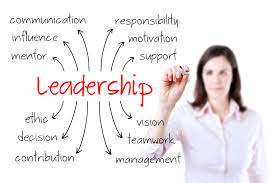James Rosebush, On Leadership

Not all leaders are game-changers.
Game-changers are supercharged leaders.
They stir the pot, alter the strategy, move the ball, and redesign the construct. They shift and alter. They are the leaders that affect history.
Here are few signs you may — or may not — be one.
1. You’re restless.
You have a low tolerance for boredom. People might advise: "get calm, quiet and centered, slow down." But if you look at people who have introduced new technologies that have changed the world — from John D. Rockefeller to Elon Musk — their stories are ones of restlessness. It’s OK if you are or are not. We need a balance in society of the restless and the calm.
2. You worry.
Worry can be converted into positive energy, but you have to know how to do it, to link opportunity to it, and to impersonalize and de-victimize yourself from it. Sit yourself down in chair and place another chair opposite you. Put the worry in the other chair and talk to it. Master it. Tell it what to do and that you are going to use it as a catapult for leadership. De-couple it from your own personality. Doing this can have powerful results. It unchains the mind. Margaret Thatcher, the Iron Lady, told me that even she worried every time she got up on stage. She harnessed it, used it as fuel. Worry did not defeat her.
3. You think you have suffered some sort of adversity.
People who have been affected by some sort of mild to mid-level stress at a young age tend to be more ardent, more ambitious, in search for solutions. They may fight more for the little guy, to see market opportunities, to right the wrongs and injustices. They may not see life as handed to them. The might feel they need to prove themselves.
4. You had to work for a living, early in life.
You are hungry — figuratively or literally, financially or otherwise. People who mowed lawns, took care of kids, cleaned carpets, had lemonade stands, were surrogate mothers and dads while their parents worked two jobs or night shifts tend to know the value of life and may have the opportunity to transform their own lives and others. Not everyone comes out of hard work at an early age as a leader, but we know that working — early on — provides a basis for self-worth, almost like nothing else does. Many leaders have come from orphanages.
5. You are a dreamer.
A doodler. You have an active imagination. You watch space exploration shows and might be a gamer. Great leaders allow themselves to think about what could be. They think about the possible and the impossible. When I was leading the building campaign for a new regional Science Center, we knew that to put kids into incubators with the tools of science, they could engage and create solutions. Schools tend to put a damper on dreaming. They should put a premium on it.
Richard BransonPaul Kane/Getty ImagesVirgin Group founder Richard Branson has always been a dreamer.
6. You are a voracious reader.
You are inquisitive. You have to know the answer. You will read all night, even after your parents, your spouse, your roommates, say you have to turn off the light and go to sleep. You have to keep reading. It was said that Thomas Edison even took cat naps with his head resting on a pile of books and that after his nap he was magically filled with the knowledge of those books. He could not breathe without books. Books are liberation, stimulation, lifters out of all kinds of poverty. Teaching the world to read at an early age would do more to advance the global economy than anything else.
7. You don’t sleep well.
You wake up with irrepressible ideas. You keep a pad and pencil or our phone next to your bed and jot during the night. You constantly make lists. My friend Fleur Cowles famously said, "I wake up expecting things." She was an inventor, artist, writer, and designer. She lived in an environment she completely designed herself. She was a prolific accomplisher of things. Some people may be born this way. Wired this way. Not all brilliant leaders suffer insomnia but once the creative process kicks in, it’s hard to hit the snooze button on your alarm.
8. You may not be sociable.
You may not like people and they may not like you, but you know the value of connections. The biographer Walter Isaacson talked about that in his massive dissection of Steve Jobs. The founder of LinkedIn knew that. A novel marketable idea that never gets funded and off the ground is worthless. Last week I participated in an incubator presentation for startups. The business creators may not have been the most motivated by human relationships, but they were passionate about selling their business plans to people they knew could help them. They at least tolerated the process and formed their ideas into coherent pitches.
9. You are smart.
But remember, there are multiple intelligences. Yours may not be conventional or just like someone else. Nevertheless, to be a leader, to change things, to be taken seriously you need a level of comprehension, and you need to be able to apply this mind to something. A smart mind allowed to atrophy is not a game-changer. Minds need to be fed and stimulated.
10. You are not a clean-desk person.
This is one of the biggest lessons I have had to learn in managing people. I was convinced that if a person had a messy desk, there were hidden evils lurking in those piles. Some people who create and tolerate a mess see their disorganization as organization. So I relented — sort of.
The world is divided into orderly and disorderly people. Both can prove themselves in the marketplace of ideas.



